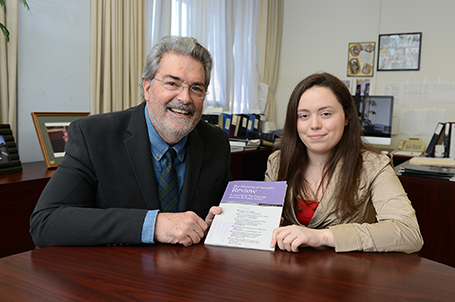Wednesday, Mar 4, 2015
Rachel Shari Safer’s co-authorship gives her an unusual and prestigious credential
by Adam Grybowski
Since Sept. 11, the most successful terrorist acts inside the United States have been accomplished through the machinations of individuals with scant ties to international organizations like Al Qaeda. In 2009, Army Major Nidal Hasan killed 13 people at Fort Hood in Texas. In 2013, the Tsarvaev brothers allegedly masterminded the Boston Marathon bombings that killed three and injured 264 participants and spectators. No ties to a larger terrorist organization have been proven in either case.
Such actions may be the hardest type of terrorism to counteract, according to James Ottavio Castagnera, associate provost and associate counsel for Academic Affairs, as well as an associate professor, who traces the roots of single-agent terrorists in an article in the Homeland Security Review called “Leaderless Resistance from 19th Century Anarchists to 21st Century Jihadists: A persistent but Evolving Tactic,” co-authored with Rachel Shari Safer. The co-authorship gave the junior an unusual, and prestigious, credit for an undergraduate.
“It’s not easy to get an undergrad past the gatekeepers at a scholarly journal as a co-author, but Rachel was a genuine co-author who wrote large sections of the article and also shepherded it through the lengthy blind-review and editorial stages,” says Castagnera. “Besides original research and writing, she worked directly with the Review’s associate editor during the final stages of editing and proofing.”
Building on what Castagnera had written, Safer expanded and updated sections of the article, which uses the history of anarchism as instruction in combating today's modern perpetrators. “It taught me how to do research on a university level and how publications work,” says Safer, who worked on the article as a sophomore. Now a second-semester junior, she has two majors (political science, global studies) and two minors (American studies, homeland security).
Safer plans to pursue a doctorate in politics on her way to an academic career. The co-author credential will help her stand out as she enters a very competitive job market.
“Coauthoring with a faculty member in a scholarly publication is a very unusual credential outside of the sciences,” says Castagnera. “We always have undergraduates in our labs, but I don’t think that it’s common for faculty to use undergrads in their scholarly research in the humanities and social sciences. A lot of the competition will have internships and double majors on their resumes, but I believe she’ll stand out because of this.”
Originally from Avon, Conn., Safer decided to enroll at Rider after attending an open house at the University and seeing the opportunities to participate in groups like the Model UN and Student Global Village. She has since seized on those opportunities and others. Now the president of the Global Studies Society, a tour guide and a member of DAARSTOC, among other activities, Safer starts every day working for the Office of Admissions. She has been employed as Castagnera’s research assistant since last year.
“I have become extremely impressed by her,” he says. Until this article, she played the more typical role of assisting Castagnera, whose expertise is law, complete preliminary research on topics like intellectual property law in China and the United States.
“I’ve had good luck with very bright students,” says Castagnera, who has published more than 50 scholarly articles in addition to 19 books. “I feel that it is our job as faculty members to facilitate as many possibilities as we can for students. That’s the ‘value-added’ of a small, private university.
“Rachel is very mature and very bright and works very hard. She’s the type of student you prize, someone who is so enthusiastic and interested in everything.”
While conscious of the resume-building aspect of working as Castagnera’s research assistant, Safer says she is driven by the desire for knowledge more than anything else. “I really enjoyed the process of learning about a topic that I wasn’t familiar with,” Safer says of the recent article. “More than obtaining the credential, I want to learn as much as I can while I’m at Rider so I can be a better citizen of the world.”

